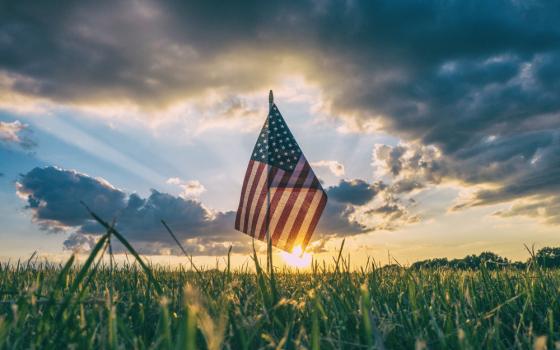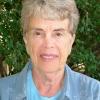Perhaps one of the greatest honors of my life was sitting next to my dad at a neighborhood Fourth of July parade. He was at the time part of a vanishing breed, the last of the World War II vets, sitting on his lawn chair waving his American flag as all the groups went by. He didn't see my tears that day, and I doubt he would have understood them.
My dad is dead now, having passed away nearly 10 years ago. I remember so vividly the army corporal who played taps at his burial. I approached him as we were all gathering around my Dad's coffin at the cemetery to prepare for the final rites. I wanted him to know a bit about my dad's service in the army, how he had his own tank which he named after my Mom, who predeceased him. I wanted the presence of this representative from our Armed Services to be more than pro forma. I still remember him turning to me and saying, "I am pleased to play for such an honorable gentleman."
It was Dad himself who caused those tears during the parade. He had passed along to me by way of example the spirit of the virtue of patriotism long before the U.S. Bishops defined it in their 1983 pastoral letter on war and peace. They wrote, "The virtue of patriotism means that as citizens we respect and honor our country, but our very love and loyalty makes us examine carefully its role in world affairs, asking that it live up to its full potential as an agent of peace with justice for all people."
I had learned our country's greatness well as I was educated by the Amityville Dominican sisters I would eventually join. There were also a few prophetic women along the way who raised questions I only barely understood at the time. Was it really necessary to drop atomic bombs on Hiroshima and Nagasaki? Was Vietnam a "just war"? As I grew and matured I came to have additional questions about my country's role in the coups in Guatemala in 1954, and in Chile 1973. I struggled with racism within our own borders.
Then I began working at the Intercommunity Center for Justice and Peace in New York City, and even more questions were raised, such as our country's policies regarding nuclear weapons and disarmament, and our role in the Central American wars of the 1980s. So while my Dad sincerely and patriotically waved his flag I exercised the virtue of patriotism by mourning all the ways my country has not lived up to its full potential. I remembered a line from a song, "Sometimes I Wish I Didn't Know."
The Fourth of July is upon us once again and I wonder how to mark the occasion. I read through a recent edition of the newspaper, wondering if I would find some concert or other event I could attend. Instead my eyes fell on a story about Rex Tillerson, the U.S. secretary of state. The headline read, "Where Trump Zigs, Tillerson Zags, Putting Him at Odds With White House." Toward the end of the article there was a discussion about the role human rights have traditionally played in our foreign policy. The reporters wrote about a recent speech in which Tillerson said that although the U.S. always treasures "freedom, human dignity, [and] the way people are treated," values cannot be allowed to "create obstacles to our ability to advance our national security interest, or our economic interests." Could it be any clearer? There is an inimical inversion of values which eats away at our potential as a nation to "live up to its full potential as an agent of peace with justice for all people."
Another headline caught my eye: "White House Pushes Military Might Over Humanitarian Aid in Africa." In a place where hunger is all too often used as a weapon of war, on a continent where Mercy Corps reports that 20 million people, most of them children, are at risk of starvation, the proposed Pentagon budget plans to reduce humanitarian assistance by almost $3 billion dollars. Could it be any clearer? There it is again: the inimical inversion of values which eats away at our potential as a nation to "live up to its full potential as an agent of peace with justice for all people."
How then to celebrate the Fourth? Here is a plan. First, when you awake on the morning of the Fourth, recall the face of a loved one who gave her or his life for freedom, whether through military service or humanitarian work. Be grateful for their presence in your life.
Second, follow the suggestion of Joanna Macy: Validate your own grief. Neither you nor I are starry-eyed idealists living in an unreal world. We are simply imperfect people ourselves who genuinely want to live gospel values consistently on the personal, interpersonal, structural and planetary/cosmic levels of reality. Contrary to the song lyrics mentioned above, be grateful that you do notice the inconsistencies. Pray that you always will. Noticing is the path to greater freedom. Take some simple action today that rights these inconsistencies both in your own life and on the structural level of reality. Unfortunately there are lots to choose from on every level!
Third — and you may need to plan ahead for this one — find someone who needs a burden lifted in order to experience greater freedom in their life, and do something to help make that happen.
Fourth, gently but resolutely avoid any conversations that you know will go nowhere or even degenerate into a violent exchange.
Fifth, especially on this Fourth of July, 2017, do everything you can to incarnate the truth of Raymond Williams, Welsh academic, novelist and critic, who wrote, "To be truly radical is to make hope possible, rather than despair convincing."
Sixth, give yourself permission to enjoy the day as a unique gift from God, while remembering all our fathers and mothers, sisters and brothers, friends and neighbors who then and now are engaged in the on-going struggle for freedom. Be a real patriot!
[Margaret Galiardi, is a Dominican Sister from Amityville, New York, whose passion is the contemplative integration of justice and peace for people and planet. She is a "lover of the wild," a spiritual director and workshop and retreat leader who has lectured nationally on the New Cosmology and the Christian Story. She spent a year living with the Trappistine monks in their monastery on the Lost Coast of Northern California in the Redwood Forest.]

